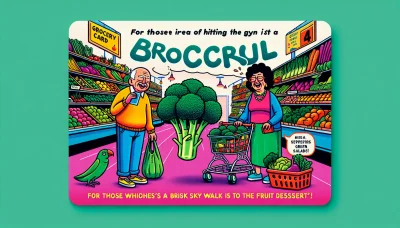Is cottage cheese anti inflammatory Quiz
Test Your Knowledge
Question of
Understanding Inflammation and Diet
The Basics of Inflammatory Responses
What is Inflammation?
Inflammation is the body's natural response to protect itself against harm. It involves the immune system fighting off invading pathogens, injuries, or toxins in an attempt to heal itself.
Acute vs. Chronic Inflammation
Acute inflammation is a short-term response with localized effects, typically beneficial, leading to healing and recovery. Chronic inflammation, on the other hand, is a long-term, often harmful response that can contribute to various diseases, including heart disease, diabetes, and cancer.
The Role of Diet in Inflammation
Diet plays a crucial role in inflammation. Certain foods can provoke an inflammatory response, while others can help reduce inflammation.
Anti-Inflammatory Diets Explained
Principles of Anti-Inflammatory Diets
Anti-inflammatory diets focus on consuming foods that support the body's immune response and reduce inflammation. These diets emphasize whole foods, rich in antioxidants, and discourage processed foods and sugars.
Foods to Include and Avoid
To follow an anti-inflammatory diet, include fruits, vegetables, whole grains, lean protein, and healthy fats. It is recommended to avoid or limit red meat, processed foods, fried foods, and sugary beverages.
The Science Behind Anti-Inflammatory Eating
Research shows that certain dietary patterns can significantly affect inflammation levels in the body. Foods rich in antioxidants and omega-3 fatty acids, for example, have been found to reduce markers of inflammation.
Cottage Cheese: An Anti-Inflammatory Powerhouse?
Nutritional Profile of Cottage Cheese
- Key Nutrients in Cottage Cheese
- Probiotics and Gut Health
- Calcium and Anti-Inflammatory Properties
Comparing Cottage Cheese to Other Dairy Products
- Cottage Cheese vs. Yogurt
- Lactose Content and Inflammation
- Full-Fat vs. Low-Fat Options
Incorporating Cottage Cheese into Your Diet
Creative Ways to Eat Cottage Cheese
Breakfast Ideas with Cottage Cheese
- Layered fruit and cottage cheese parfaits
- Cottage cheese pancakes or waffles
- Scrambled eggs mixed with cottage cheese
- Smoothies with a scoop of cottage cheese for added protein
Savory Snacks and Meals
- Cottage cheese spread on whole-grain crackers or toast
- Stuffed bell peppers with a mixture of cottage cheese and spices
- Cottage cheese mixed with herbs and used as a dip for vegetables
- Salads topped with cottage cheese instead of dressing
Sweet Treats and Desserts
- Cottage cheese blended with fruits and honey as a dessert cream
- Cheesecake recipes substituting cottage cheese for cream cheese
- Frozen blended cottage cheese pops with fruit pieces
- Cottage cheese with a sprinkle of cinnamon and sugar over baked apples
Pairing Cottage Cheese with Anti-Inflammatory Foods
Fruits and Vegetables to Combine with Cottage Cheese
- Berries, such as blueberries, strawberries, and raspberries
- Leafy greens like spinach and kale
- Cherry tomatoes and cucumbers for a refreshing salad
- Avocado slices for a creamy texture and healthy fats
Whole Grains and Healthy Fats
- Serving cottage cheese over a bed of quinoa or brown rice
- Adding nuts or seeds for a crunchy texture
- Drizzling olive oil over cottage cheese and veggies for extra flavor
Herbs and Spices for Flavor and Health Benefits
- Mixing cottage cheese with turmeric, garlic, or ginger for an anti-inflammatory boost
- Adding fresh herbs like dill, basil, or parsley to enhance flavor
- Seasoning with black pepper or paprika for a bit of spice
Potential Benefits of Cottage Cheese for Inflammation
Research on Dairy and Inflammation
- Studies on Cottage Cheese Consumption
- Dairy Sensitivities and Inflammatory Markers
- The Role of Amino Acids in Inflammation Control
Case Studies: Success Stories and Testimonials
- Personal Experiences with Cottage Cheese Diets
- Professional Athletes and Recovery Diets
- Long-Term Health Outcomes
Addressing Common Concerns About Dairy and Inflammation
Lactose Intolerance and Inflammatory Reactions
Understanding Lactose Intolerance
Lactose intolerance is a condition where the body lacks the enzyme lactase, which is necessary for breaking down lactose, the sugar found in milk and dairy products. This can lead to symptoms such as bloating, gas, and abdominal discomfort after consuming dairy.
Alternatives to Traditional Cottage Cheese
For those with lactose intolerance or looking to reduce dairy intake, there are several alternatives to traditional cottage cheese. These include lactose-free versions, as well as plant-based options made from soy, almond, or coconut.
Managing Symptoms While Enjoying Dairy
Managing lactose intolerance doesn't have to mean avoiding dairy altogether. Options like lactose-free milk and cheeses, as well as consuming smaller amounts of dairy, can help individuals enjoy dairy without discomfort.
Debunking Myths About Dairy Inflammation
Misconceptions About Dairy Products
Many believe that dairy products inherently cause inflammation in the body. However, this belief is largely based on misconceptions and a misunderstanding of how dairy affects the body.
Scientific Evidence on Dairy and Inflammation
Recent studies have shown that dairy products do not necessarily cause inflammation. In fact, some dairy products, especially those high in probiotics like yogurt, may have anti-inflammatory properties.
Expert Opinions on Dairy Consumption
Nutrition experts suggest that dairy can be part of a healthy diet. They emphasize the importance of choosing the right types of dairy products, such as those low in sugar and high in beneficial nutrients, to maximize health benefits.
Planning an Anti-Inflammatory Diet with Cottage Cheese
Sample Meal Plans Featuring Cottage Cheese
Daily Anti-Inflammatory Diet Schedule
Start your day with a breakfast of cottage cheese topped with antioxidant-rich berries and a sprinkle of flaxseeds. For lunch, enjoy a mixed greens salad with cottage cheese, chickpeas, and a variety of colorful vegetables. Dinner can be grilled salmon served with a side of cottage cheese and roasted vegetables. Snack on cottage cheese with cucumber slices or cherry tomatoes throughout the day.
Recipes for Balanced Meals
Try a smoothie bowl with cottage cheese, spinach, pineapple, and a touch of honey for breakfast. For a satisfying lunch, mix cottage cheese with quinoa, black beans, corn, and avocado for a Tex-Mex bowl. Dinner could be stuffed bell peppers with cottage cheese, turkey, and spices, baked until tender.
Snack Ideas for Inflammation Reduction
Whip up a quick dip by blending cottage cheese with herbs and garlic to serve with fresh vegetable sticks. Another great snack is whole grain crackers topped with cottage cheese and a slice of tomato or radish.
Monitoring Your Body's Response to Diet Changes
Keeping a Food and Symptom Diary
Document what you eat and any symptoms you experience. Note changes in energy levels, digestion, and any signs of inflammation. This can help identify foods that work well for you and those that don't.
When to Consult a Nutritionist or Doctor
If you notice persistent discomfort, increased inflammation, or no improvement in symptoms, it may be time to consult a professional. They can provide personalized advice and adjustments to your diet plan.
Adjusting Your Diet for Optimal Health Benefits
Based on your diary and professional advice, tweak your diet to include more of what benefits you and eliminate foods that trigger inflammation. Remember, the goal is to find a balanced, enjoyable diet that reduces inflammation and supports overall health.












